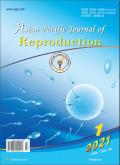Effects of L-arginine on preeclampsia risks and maternal and neonatal outcomes: A systematic review and meta-analysis
IF 0.6
Q4 REPRODUCTIVE BIOLOGY
引用次数: 0
Abstract
Objective: To summarize whether the supplementation of L-arginine in pregnant women helps in management of preeclampsia and its impact on maternal and neonatal outcomes. Methods: Studies conducted from the past 17 years (1999 to 2016). were referred from database like Cochrane Central Registry of Controlled Trials (CENTRAL), Scopus, Google Scholar and PubMed. Out of 134 studies, 7 studies were included. L-arginine versus placebo was considered for quantitative analysis. Modified Cochrane data extraction form was used to collect the data. The risk of bias was assessed using Cochrane’s risk of bias assessment tool in RevMan 5.4 and the summary of findings was determined using GradePro software. Results: L-arginine showed a significant reduction of preeclampsia [odds ratio (OR) 0.38; 95% confidence interval (CI) 0.25, 0.58)]. There was a significant reduction in systolic blood pressure [mean difference (MD) -2.47; 95% CI -4.53, -0.42] and diastolic blood pressure (MD -0.97; 95% CI -3.83, 1.89). The effects of L-arginine on secondary outcomes like maternal gestational age, latency, neonatal weight, and appearance, pulse, grimace, activity, respiration (APGAR) score at 1st and 5th minute were not statistically significant. Conclusions: L-arginine supplementation is effective in lowering systolic and diastolic blood pressure of preeclamptic patients. However, it has no noticeable effects on maternal and neonatal outcomes.l -精氨酸对子痫前期风险及孕产妇和新生儿结局的影响:一项系统综述和荟萃分析
目的:总结孕妇补充l -精氨酸是否有助于子痫前期的治疗及其对孕产妇和新生儿结局的影响。方法:研究时间为1999 - 2016年,共17年。均来源于Cochrane Central Registry of Controlled Trials (Central)、Scopus、谷歌Scholar和PubMed等数据库。在134项研究中,纳入了7项研究。将l -精氨酸与安慰剂进行定量分析。采用改进的Cochrane数据提取表收集数据。使用RevMan 5.4中的Cochrane偏倚风险评估工具评估偏倚风险,使用GradePro软件确定结果总结。结果:l -精氨酸显著降低子痫前期[优势比(OR) 0.38;95%置信区间(CI) 0.25, 0.58)]。收缩压显著降低[平均差值(MD) -2.47;95% CI -4.53, -0.42]和舒张压(MD -0.97;95% ci -3.83, 1.89)。l -精氨酸对产妇胎龄、潜伏期、新生儿体重、第1分钟和第5分钟外观、脉搏、面部表情、活动、呼吸(APGAR)评分等次要结局的影响无统计学意义。结论:补充l -精氨酸可有效降低子痫前期患者的收缩压和舒张压。然而,它对产妇和新生儿的结局没有明显的影响。
本文章由计算机程序翻译,如有差异,请以英文原文为准。
求助全文
约1分钟内获得全文
求助全文
来源期刊

Asian Pacific Journal of Reproduction
Veterinary-Veterinary (all)
CiteScore
1.70
自引率
0.00%
发文量
588
审稿时长
9 weeks
期刊介绍:
The journal will cover technical and clinical studies related to health, ethical and social issues in field of Gynecology and Obstetrics. Articles with clinical interest and implications will be given preference.
 求助内容:
求助内容: 应助结果提醒方式:
应助结果提醒方式:


